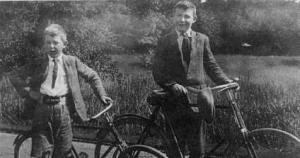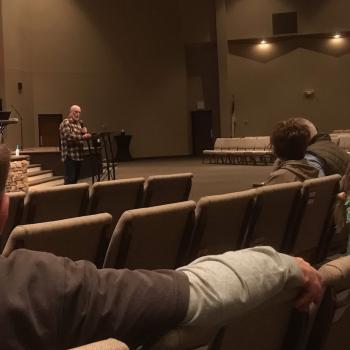Once again, we enter into the realm of C.S. Lewis, as Vernell Ingle (Dad) reflects on his works. He read the Chronicles of Narnia out loud to my siblings and I when we were young. Furthermore, he developed voices for each character, a dizzying talent. So his readings were fascinating. As a grandpa, he now carries on the tradition with his grandchildren.
This is the third in a series about C.S. Lewis
First of all, I wrote a couple weeks ago about a meeting with Thomas Woodward, the President of the C.S. Lewis Society. I focused on the narrative that led to Lewis’ salvation.
Aslan Acrostic: Dr. Thomas Woodward shares the story of C.S. Lewis
Second, I began sharing Dad’s unique and interactive paper.[1] By the time of this writing in seminary, Vernell had read 13 C.S. Lewis books. Also for this paper, he read 2 Lewis books for a second time, and 3 new Lewis books.
Vernell Ingle reflects on the works of C.S. Lewis
As he reflects, he interacts personally with the works as they intersect with his own life. This is a spiritual formation paper, so he invites us to share the journey.
He organized the project into subsections according to some of Lewis’ works
1) Search for Joy (his autobiography)
2) Natural versus Supernatural (Miracles)
3) Men Without Chests (Abolition of Man)
4) The Stone Table (The Lion, The Witch, and The Wardrobe)
5) Lunatic, Madman, Fiend, or God? (Mere Christianity)
We’ve started the section Search for Joy. So in review we start with the last couple paragraphs from the previous post.
Search for Joy (continued)
At least his parents took Lewis to church. There was an outward form only, but virtually no religious experience occurred in those early years. “I was taught the usual things and made to say prayers and in due time taken to church. I naturally accepted what I was told but I cannot remember feeling much interest in it.”[2]
Lewis claimed that although his childhood was imaginative, it lacked wonder, and he abhorred emotions. He admitted there was both a dislike and a distrust of emotion. This left him with the intellect, so he became an avid reader himself, early on.
He mother died after a period of illness while he was still young. In some ways, he claims this estranged him and his brother from his father. He and his brother drew closer together and their father never fully recovered from the loss.
As a boy he approached God without fear or awe, or at least his idea of God. In his first boarding school he became a believer. It was there that he became acquainted with Christian doctrine, even though he had already believed much of what he heard on Sundays and in school.
 Warren & C.S. Lewis | Brothers and Friends:
Warren & C.S. Lewis | Brothers and Friends:
the Diaries of Major Warren Hamilton Lewis | 1983
At 13 he and his brother set out to England to attend another boarding school. It was there that he ceased to be a Christian.
There were two things he pointed to that contributed to stripping him of his belief
First, one of the matrons at the school expanded his knowledge through her conversations with him of all kinds of works. It was not her intention to destroy his faith:
“But the result of Miss C.’s conversation did not stop there. Little by little, unconsciously, unintentionally, she loosened the whole framework, blunted all the sharp edges, of my belief. The vagueness, the merely speculative character, of all this occultism began to spread – yes, and to spread deliciously – to the stern truths of the creed.”[3]
Secondly, he readily admitted that he was already anxious to be relieved of the burden of his personal religion. To him it had become an intolerable burden. He read his Bible and prayed, but was informed that he needed to make sure he thought clearly about everything he prayed. This he attempted vigorously until it deprived him of sleep at times. Thus early on, his religious experience became a legalistic weight.
Therefore, he was most happy to shed this faith, also being prompted by intellectual pessimism.[4] After he was relieved of his faith he initially, aggressively pursued sexual temptations. The world became an attraction to him.
His desire was for glitter, swagger, distinction, the desire to be in the know
He confessed, “I began to labor very hard to make myself into a fop, a cad, and a snob.”[5]
Through the years, Lewis plowed into the world of heavy academia with a vengeance. All the while, he became even more pessimistic, but was in turmoil as he attempted to keep the idea of God at bay:
“I was at the time living, like so many Atheists or Antitheists, in a whirl of contradictions. I maintained that God did not exist. I was also very angry with God for not existing. I was equally angry with Him for creating a world.”[6]
His mind was divided into two compartments
There was the imaginative which he called a many-islanded sea of poetry and myth, and the intellect which he called a shallow rationalism. Everything he loved he believed to be imaginary, and everything he believed he thought to be grim and meaningless.[7]
Christianity offered no doors of escape. The externals of Christianity did not appeal to him. The reason being that he admitted to possessing a deep-seated hatred for authority, monstrous individualism, and lawlessness.
He despised interference and Christianity spoke of a great, transcendent Interferer.[8]
Basic Questions:
I would like to share more of the paper this week, however I believe this is where we have to stop.
1. Isn’t this where many of our friends and loved ones have stopped as well? Have you listened to the story of a self-proclaimed agnostic or atheist?
2. Even if Lewis believed in God, can he still ask why? . . . Why was there so much pain? . . . Or why did his mom have to die? . . . And why was there no relief in the forms of Christian religion that he had encountered? Have you listened to the story of an “unbeliever,” then realized that he was a “believer” that was buried alive under pain?
3. If someone carries such great pain, can he trust again in “a great, transcendent Interferer?” For Lewis the atheist, and any unbeliever, how important are their views or perceptions of God?
4. Do you just want to turn the page like I do, to witness the prodigal’s return? Why did I stop at this point in Lewis’ life? Because I believe that we really can’t evangelize the lost until we meet them in their story. Isn’t that what our Lord did? We don’t have to participate in their folly, but how can we lead them to the cross if we don’t even know where they are?
May our eyes and ears be opened this week to the cry of their souls, below the surface of their doubt and disbelief.
[1] Vernell Ingle, “Reflections on the Life and Words of C.S. Lewis,” (paper presented in Spiritual Formation of the Minister, Assemblies of God Theological Seminary, Springfield, MO, August 11, 1998). [2] C.S. Lewis, Surprised By Joy: The Shape of My Early Life (London: Harcourt Brace and Company, 1955), 7.
Amazon: Surprised by Joy













